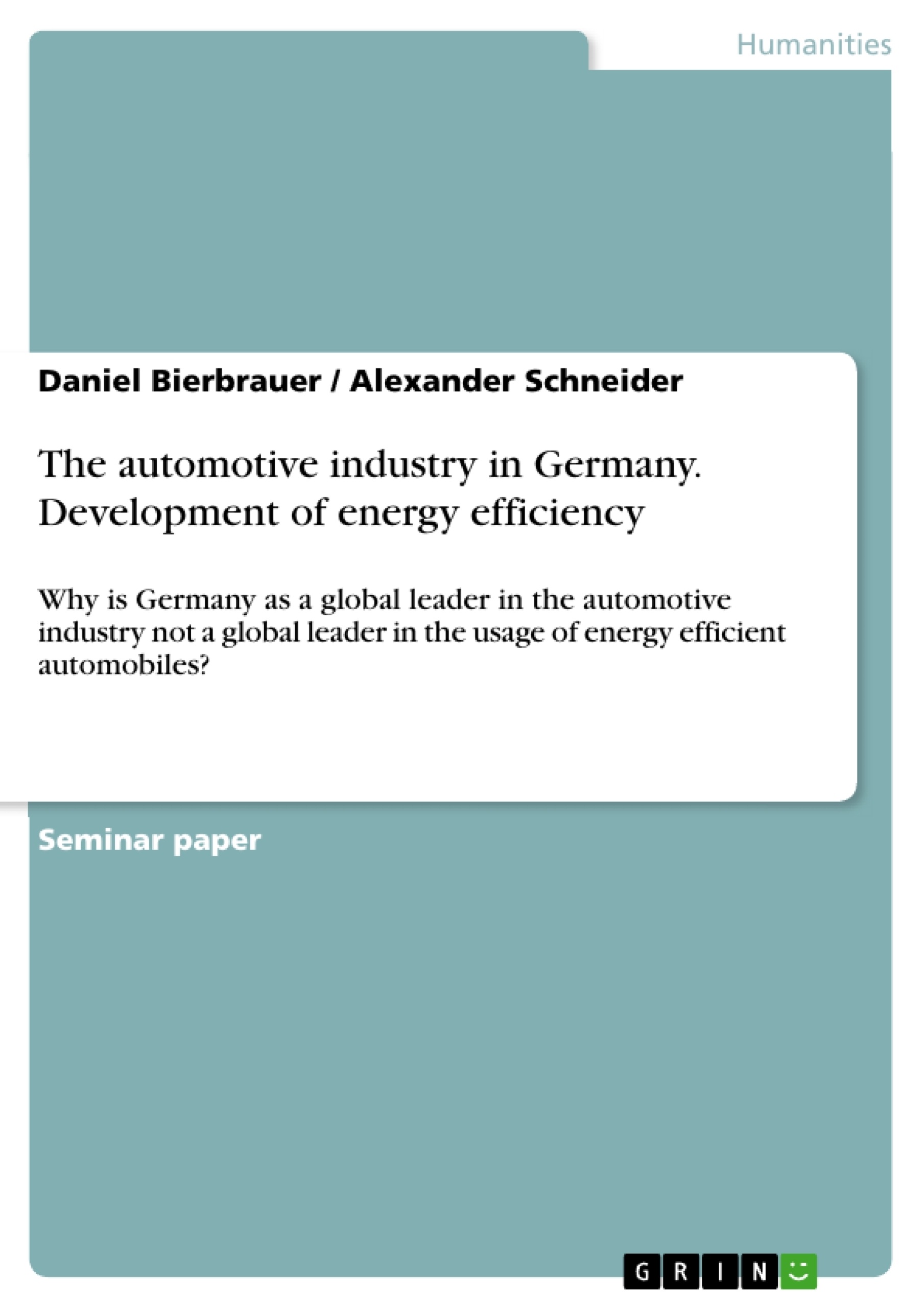This paper will focus on the e-mobility and the evolution of electric vehicles and discuss environmental issues that are closely connected to the green movement. First a brief overview of the environmental aspects, related to the topic mentioned will be given. There will be a discussion not only on those aspects on a national level but also on a European and global level. Furthermore, this text will deal with the technology of the e-mobility and focus on exploring which economic, environmental and political aspects are connected with e-mobility and environmental concerns in Germany. Additionally, an international comparison between Germany and France, and Germany and the USA will be made; to enable the reader to know where these countries stand concerning sales of electric vehicles, political action and infrastructure of e-mobility.
Over the past 40 years one can observe an evolution of “environmental concern” in several areas. This transition is called an evolution from environmentalism to green. There is a shift from emphasizing environmental problems to the underlying problems with our social, economic, technical or legal system. Further, the geographical focus changes from local problems to global issues. There has been a gradual change in the attitude towards business. From the business as the core of the problem to the business as a part of the solution to problems can be observed as well.
From a marketing point of view one can observe the emerging importance of green awareness in the media during the late 80s. It is argued that a change in consumption behaviour of consumers led to the reaction of the producers. Moreover, since the early 1990s, more than 85% of the multinational companies in Europe have adapted themselves to this green movement by changing their way of production. In this connection, not just specific sectors in the European economy have been affected by this adjustment process, but almost every line of businesses. Technological change is denoted as a possible solution to some negative environmental effects. In the same context it is added that new technologies also may introduce new environmental issues, such that the strategic management towards sustainability became increasingly important.
Inhaltsverzeichnis (Table of Contents)
- Introduction
- Energy efficiency and current technology of e-mobility
- Energy efficiency on an Global, European and German level
- Electric cars and the today’s powertrain portfolio
- Different perspectives to look on the German automotive industry
- Economic Perspective
- Environmental Perspective
- Political Perspective
- Rolling up the field from behind?
- Comparison with France
- Comparison with USA
- Criticism and Conclusion
Zielsetzung und Themenschwerpunkte (Objectives and Key Themes)
This seminar paper examines the relationship between Germany's status as a global leader in the automotive industry and its comparatively low adoption rate of energy-efficient vehicles, particularly electric vehicles (EVs). It seeks to analyze the economic, environmental, and political factors influencing this disparity.
- The evolution of environmental awareness and its impact on the automotive industry.
- The current state of energy efficiency and electric vehicle technology, including a comparison of different powertrain types.
- The challenges and opportunities associated with electric mobility in Germany, including economic considerations, environmental impacts, and political incentives.
- An international comparison of Germany's approach to electric mobility with France and the USA, highlighting differences in policy, infrastructure, and consumer adoption.
- The role of government subsidies, infrastructure development, and consumer perception in driving the adoption of EVs.
Zusammenfassung der Kapitel (Chapter Summaries)
The paper begins by highlighting the shift in public discourse from environmental concerns to broader social and economic issues related to sustainability. This shift is traced through the emergence of green awareness in the 1980s and the adoption of environmental considerations within business practices. The importance of technological change in addressing environmental challenges is emphasized, while acknowledging the complexity of factors influencing technological adoption.
Chapter 2 provides a brief overview of the environmental aspects of energy efficiency, with a focus on CO2 emissions. It highlights the global and European goals for CO2 reduction, the Kyoto Protocol, and the EU's Energy Strategy 2020. It also discusses the current status of electric and hybrid vehicles in Germany, France, and the USA, emphasizing the diversity of market shares across different countries.
Chapter 3 examines different perspectives on the German automotive industry, particularly in relation to electric vehicles. It analyzes the economic aspects, including the potential impact of EVs on electricity consumption and the emerging importance of battery production. From an environmental perspective, the chapter discusses the potential benefits of EVs in reducing CO2 emissions, while acknowledging the need to ensure the eco-friendliness of electricity production. The political perspective explores the role of government subsidies, R&D investments, and infrastructure development in promoting the adoption of EVs. It also examines the potential influence of consumer perception and political considerations on the development of electric mobility in Germany.
Chapter 4 compares Germany's approach to electric mobility with France and the USA. It analyzes the similarities and differences in sales figures, government subsidies, infrastructure development, and consumer demand for electric vehicles. It highlights the significant role of government policies in stimulating the adoption of EVs, particularly in countries like Norway and the Netherlands.
Schlüsselwörter (Keywords)
The paper focuses on key concepts related to energy efficiency, electric vehicles, and the German automotive industry. These include: electric mobility, CO2 emissions, energy storage, battery technology, government subsidies, infrastructure development, consumer perception, and international comparisons.
- Quote paper
- Daniel Bierbrauer (Author), Alexander Schneider (Author), 2015, The automotive industry in Germany. Development of energy efficiency, Munich, GRIN Verlag, https://www.hausarbeiten.de/document/334424


